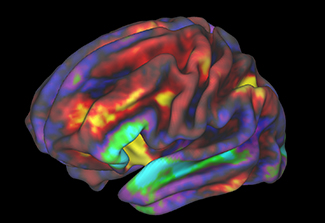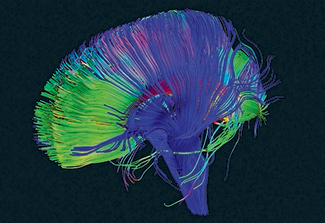Fogarty’s Global Brain Disorders Research Program enters its third decade
November/December 2023 | Volume 22 Number 6
By Susan Scutti
 Photo courtesy of National Institute on Drug AbuseA functional MRI (fMRI) image of preteen brain while child performs a working memory task. The regions in yellow and red are the most active.
Photo courtesy of National Institute on Drug AbuseA functional MRI (fMRI) image of preteen brain while child performs a working memory task. The regions in yellow and red are the most active.
Fogarty's
Global Brain and Nervous System Disorders Research across the Lifespan program is all grown up now: the initiative celebrates its 20th anniversary this year. Global Brain provides grants to help investigators build research capacity in low- and middle-income countries (LMICs) while conducting research on health issues related to the brain and extended nervous system that affect people living there. The program's long-term goal is to sustain the advancement of research capabilities in the areas of nervous system function and nervous system impairment across the globe.
“Since the program's inception in 2002, Fogarty has conferred 314 total awards to support research in 66 low- and middle-income countries," said Dr. Kathleen Michels, who founded the program and has since retired. “For every $1 invested by Fogarty, co-sponsoring institutes at the NIH and other partners have invested more than $6, multiplying the scientific and capacity building reach of the program."
The need for this program is clear. According to the Global Burden of Disease survey, neurological disorders are the leading cause of disability and the second leading cause of death worldwide. Over time, death and disability due to neurological diseases have risen substantially, particularly in LMICs. In fact, a concerning paradox exists: positive trends in LMICs—such as improvements in health care and increasing life expectancy—lead to more children surviving past age 5 into adulthood (and into advanced age) with their brain health impaired, due to early illnesses, malnutrition, and adverse environmental impacts and experiences.
Scientists eligible for Global Brain program awards include investigators in LMICs who partner with colleagues in the U.S. or upper middle-income countries. These collaborations result in unique scientific unions and projects that are likely to produce research findings ripe for translation within both LMICs and an American or other higher income context as well as opportunities for bidirectional learning.
In the past, Global Brain program investigators have addressed a range of diseases and disorders. For example, Dr. Jelena Radulovic of Northwestern University received an award to study post-traumatic stress disorder (PTSD) in Serbia. Radulovic's team enhanced research capacity at Serbia's Vinca Institute while developing a strong cross-cultural program in basic and translational research in partnership with a Northwestern University laboratory. This collaboration accelerated the discovery of therapeutic, diagnostic, and prognostic targets for PTSD. Her most recently published paper explored the molecular and cellular mechanisms of
how memories of stressful events contribute to depression-like behavior.
Another case in point: the NeuroGAP-Psychosis project, led by Dr. Karestan Koenen, is a collaboration of Addis Ababa University in Ethiopia, Makerere University in Uganda, and the University of Cape Town in South Africa in partnership with the Harvard T.H. Chan School of Public Health. The ongoing project aims to
build and expand the capacity of African scientists to conduct large-scale genetic studies of schizophrenia and other psychotic disorders by enabling the local generation, analysis and interpretation of data. Scientists will also work to validate tools for diagnosing and screening for schizophrenia and psychosis, characterize the clinical phenomenology of 13,000 patients with schizophrenia and psychotic disorders, and perform the largest gene-discovery study of schizophrenia in Africa to date.
 Photo courtesy of National Institute of Child Health and Human Development/P. BasserThe brain's neural pathways illustrated using tractography, a technique for modeling diffusion-tensor magnetic resonance imaging (dt-MRI) data.
Photo courtesy of National Institute of Child Health and Human Development/P. BasserThe brain's neural pathways illustrated using tractography, a technique for modeling diffusion-tensor magnetic resonance imaging (dt-MRI) data.
Other notable projects include a planning grant to reduce the burden of chronic psychotic disorders in Tanzania; a psychobiological study of early psychosis in China; an exploration of the family consequences of Zika in Brazil; an investigation of maternal traumatic stress and child development in South Africa; a study of internet-based treatment for common mental disorders in Latin America; an exploration of the genetics of psychosis in Africa; a study on dementia and related health and social challenges in Lebanon; and schizophrenia research capacity building in Macedonia.
"The program has a long history of research on neuroinfectious diseases, especially in sub-Saharan Africa, which accounts for about 70% of the awarded grants. It has also emphasized neurodevelopmental toxicology research," according to former program director Michels. “Examples include Dr. Chandy John's work on malaria and neurodevelopment in Kenya and Uganda and Dr. Desire Tshala-Katumbay's work on
konzo in the Democratic Republic of Congo."
This exceptional Fogarty program has attracted the support of eight institutes/centers across NIH: National Center for Complementary and Integrative Health (NCCIH); National Eye Institute (NEI); National Institute on Aging (NIA); Eunice Kennedy Shriver National Institute of Child Health and Human Development (NICHD); National Institute on Deafness and Communications Disorders (NIDCD); National Institute of Environmental Health Sciences (NIEHS); National Institute of Mental Health (NIMH); and National Institute of Neurological Disorders and Stroke (NINDS). Acting Fogarty Director Peter Kilmarx stated, “The Global Brain program is unique for NIH in that it combines planning and research project grants on brain and nervous system disorders research. It's been very successful and brings together a diversity of research areas and geographies. I'm eager to see it continue." Congratulations to all who've contributed to Global Brain's many achievements.
More Information
Updated December 5, 2023
To view Adobe PDF files,
download current, free accessible plug-ins from Adobe's website.
Related Fogarty Programs
Related Global Health Research Topics